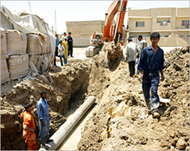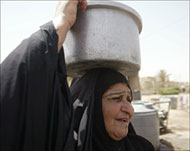Untitled Document
 |
Iraq's water infrastructure is severely
dilapidated |
Iraq, the land of two rivers that once irrigated the world's earliest civilisations,
needs up to $15 billion to repair a dilapidated water system crippled by war and
neglect, the country's water minister said on Tuesday.
More than two years after the fall of Saddam Hussein, the country of the Euphrates
and the Tigris is struggling with recurrent water shortages in Baghdad and other
large cities, poor sanitation and a shattered irrigation network.
Water Resources Minister Latif Rashid said fighters intent on undermining the
new government are much to blame for the current water crisis and said pledged
reconstruction money has been slow to materialise.
"Iraq is a country rich in water resources. We have large reservoirs,
two large rivers, a large number of river branches, adequate ground water, the
marshland area," Rashid said on the sidelines of a reconstruction conference
in Amman, Jordan.
"What Iraq needs is large investments."
Rashid said the bill for repairing and building dams, irrigation canals, sewage
systems and purification stations for drinking water amounts to somewhere between
$10 and $15 billion.
 |
Some Iraqis have a daily battle
for water despite rich resources |
| |
Daily attacks
The United States earmarked $3.7 billion to help rebuild Iraq's water system
but a large part of that cash has been cut back, swallowed by security cuts,
he said.
"They have started some projects in our ministry. I think we are getting
probably a total cost for the projects of $400 million and they have started spending
that amount of money," Rashid said.
A donors' meeting is scheduled for next month in Amman.
Last week, two million Baghdadis went without fresh water after officials said
fighters sabotaged one of the main water plants that feeds the Iraqi capital,
where summer temperatures can top 50C.
"We suffer daily from terrorists sabotaging our infrastructure. There
was serious damage in Baghdad ... but most of it has been repaired," Rashid
said.
Water and electricity shortages are draining residents' confidence in the new
Shia-led government, elected five months ago in polls many hoped would bring
order and good governance.
Management issues
Iraq needs an estimated 15,000 megawatts of power a day but it only generates
5000 megawatts, according to Rashid.
Liqaa Maki, an Iraq analyst, told Aljazeera.net that the Iraqi government and
foreign donors must share the blame for water shortages.
"In over half the cities and towns in Iraq there hasn't been a single
explosion in more than two years, but in these places there are still major
problems," he said.
The fact is that we are just not seeing any real investment in the water infrastructure."
He added: "In the town of al-Rumaitha (north of Baghdad) there has not
been a single bombing or killing in over two years and there has never been
a problem with the water supply in decades.
"But this week the government cut off water to the entire region which
subsequently provoked demonstrations. How can the government blame the resistance
for these problems when it is obviously a result of bad management and a lack
of investment?"

